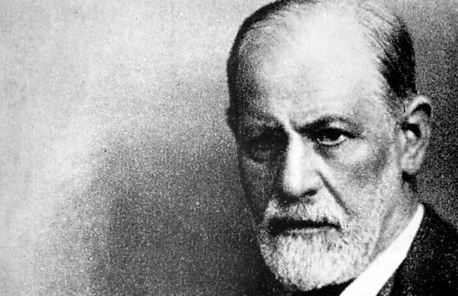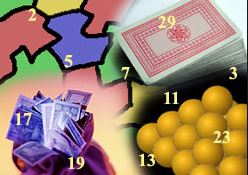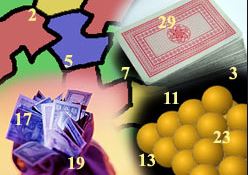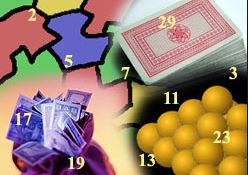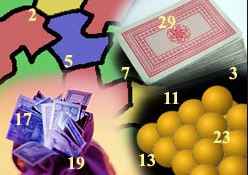Select one or more of these popular tags:
-
Faust - Episode 4
-
Martin Jenkin
Gretchen is pregnant with Faust's child, but the worst is yet to come. Adapted Devil-dealing fable starring Mark Gatiss.
Gretchen is pregnant with Faust's child, but the worst is yet to come. Adapted Devil-dealing fable starring Mark Gatiss.
-
Faust - Episode 5
-
Martin Jenkin
Faust becomes bored by years of wish fulfilment. Fable adaptation of a man selling his soul to the Devil. Stars Mark Gatiss.
Faust becomes bored by years of wish fulfilment. Fable adaptation of a man selling his soul to the Devil. Stars Mark Gatiss.
-
Follow the Leader, Episode 1
-
Carolyn Quinn
Carolyn Quinn looks under the bonnet of leadership in this two-part series, from business to politics and sport. What traits do you need to become a great leader? Is leadership 'in the blood' or can you train people to develop the right skills?
Carolyn Quinn looks under the bonnet of leadership in this two-part series, from business to politics and sport. What traits do you need to become a great leader? Is leadership 'in the blood' or can you train people to develop the right skills?
-
Follow the Leader, Episode 2
-
Carolyn Quinn
Carolyn Quinn examines the psychology of leadership. Once you've secured your position as leader, how do you deal with the demands at the top? The level of media attention across all sectors, from politics to football, means that today's leaders are under more scrutiny than ever before. In the last episode, Carolyn explores the challenges of modern leadership, from stepping up to the top job, to stepping down.
Carolyn Quinn examines the psychology of leadership. Once you've secured your position as leader, how do you deal with the demands at the top? The level of media attention across all sectors, from politics to football, means that today's leaders are under more scrutiny than ever before. In the last episode, Carolyn explores the challenges of modern leadership, from stepping up to the top job, to stepping down.
-
Freudian Slips - 01 Sexual Aberrations
-
Sigmund Freud
Written in 1905, Freud's groundbreaking 'Three essays on the theory of sexuality' is one of the pillars on which modern psychoanalysis rests. In the first of these essays, 'Sexual Aberrations' Freud unravels the complex diversity of human desire. Lisa talks to author, Kathy Lette to find out why fetishism isn't too far from shopping and she meets writer and psychoanalyst, Adam Phillips to find out why Freud thought the sexual instinct is such an irresistible force.
Written in 1905, Freud's groundbreaking 'Three essays on the theory of sexuality' is one of the pillars on which modern psychoanalysis rests. In the first of these essays, 'Sexual Aberrations' Freud unravels the complex diversity of human desire. Lisa talks to author, Kathy Lette to find out why fetishism isn't too far from shopping and she meets writer and psychoanalyst, Adam Phillips to find out why Freud thought the sexual instinct is such an irresistible force.
-
Freudian Slips - 02 Infantile Sexuality
-
Sigmund Freud
The second of Freud's 'Three essays on the theory of sexuality' is his ground breaking and shocking exploration of the relationship between children and their parents. In 'Infantile Sexuality' Freud outlines why our experiences and frustrations in childhood form the basis for our adult neuroses. Lisa Appignanesi talks to psychoanalysts and writers to find out how Oedipus lives on today.
The second of Freud's 'Three essays on the theory of sexuality' is his ground breaking and shocking exploration of the relationship between children and their parents. In 'Infantile Sexuality' Freud outlines why our experiences and frustrations in childhood form the basis for our adult neuroses. Lisa Appignanesi talks to psychoanalysts and writers to find out how Oedipus lives on today.
-
Freudian Slips - 03 Transformations of Puberty
-
Sigmund Freud
In The last of Freud's essays on sexuality he explains why the troubled adolescent has to relive childhood in a bid to leave home. Lisa talks to psychoanalysts working today to find out how the struggles of adolescence have changed over the course of hundred years. She also talks to writer, Sue Townsend to find out what inspired her to write about teenager Adrian Mole and what Freud might have made of him, now, aged 38 and 3/4.
In The last of Freud's essays on sexuality he explains why the troubled adolescent has to relive childhood in a bid to leave home. Lisa talks to psychoanalysts working today to find out how the struggles of adolescence have changed over the course of hundred years. She also talks to writer, Sue Townsend to find out what inspired her to write about teenager Adrian Mole and what Freud might have made of him, now, aged 38 and 3/4.
Fragment of an Analysis of a Case of Hysteria' is Freud's first great case history. Dora was brought to Freud for analysis by her father because of hysterical symptoms and threatened suicide. Dora rejected Freud's interpretations and fled before her treatment was over. Why did she leave and what did Freud learn from his apparent failure? Lisa talks to psychoanalyst and writer, Susie Orbach to find out why 'Dora' would lead to the invention of one of psychoanalysis's most important tools.
Fragment of an Analysis of a Case of Hysteria' is Freud's first great case history. Dora was brought to Freud for analysis by her father because of hysterical symptoms and threatened suicide. Dora rejected Freud's interpretations and fled before her treatment was over. Why did she leave and what did Freud learn from his apparent failure? Lisa talks to psychoanalyst and writer, Susie Orbach to find out why 'Dora' would lead to the invention of one of psychoanalysis's most important tools.
The Joke Book. In 'Wit and its relation to the Unconscious' Freud explained why the joke, like the dream provides a unique window into the unconscious. Lisa talks to comic Arnold Brown and therapist turned comedian Inder Manocha, to find out what drives the urge to make others laugh. She also talks to psychoanalysts David Bell to find out why we laugh, why we give ourselves away by our jokes and asks if there is a place for humour on the therapist's couch.
The Joke Book. In 'Wit and its relation to the Unconscious' Freud explained why the joke, like the dream provides a unique window into the unconscious. Lisa talks to comic Arnold Brown and therapist turned comedian Inder Manocha, to find out what drives the urge to make others laugh. She also talks to psychoanalysts David Bell to find out why we laugh, why we give ourselves away by our jokes and asks if there is a place for humour on the therapist's couch.
-
Front Row Special - Brian Aldiss
-
Mark Lawson
Venerated as one of the most important science fiction writers today, Brian Aldiss discusses his latest work with Mark Lawson.
Venerated as one of the most important science fiction writers today, Brian Aldiss discusses his latest work with Mark Lawson.
-
Front Row Special - David Lodge
-
Mark Lawson
Mark Lawson interviews David Lodge who's new novel Author, Author journeys back to the 1880s to explore Henry James' middle years...
Mark Lawson interviews David Lodge who's new novel Author, Author journeys back to the 1880s to explore Henry James' middle years...
-
Front Row Special - Harold Pinter
-
Mark Lawson
Harold Pinter has won the Nobel Prize for Literature. Listen to a special profile and to a full length Interview with Pinter.
Harold Pinter has won the Nobel Prize for Literature. Listen to a special profile and to a full length Interview with Pinter.
-
Front Row Special - Joanna Trollope
-
Mark Lawson
Author, Joanna Trollope talks to Francine about her latest novel Brother and Sister which looks at on the effect of adoption on several generations.
Author, Joanna Trollope talks to Francine about her latest novel Brother and Sister which looks at on the effect of adoption on several generations.
-
Front Row Special - John Le Carré
-
Mark Lawson
In a special edition of Front Row, Mark Lawson talks in a rare extended interview to writer John le Carré. As his latest book Absolute Friends is published, le Carré looks back at his childhood and his relationship with his father. He explains how his work for the British foreign service has influenced his writing and reflects on the current international political situation.
In a special edition of Front Row, Mark Lawson talks in a rare extended interview to writer John le Carré. As his latest book Absolute Friends is published, le Carré looks back at his childhood and his relationship with his father. He explains how his work for the British foreign service has influenced his writing and reflects on the current international political situation.
-
Front Row Special - Julian Barnes
-
Mark Lawson
Mark Lawson talks to Barnes in his London home about his writing career, why his Who's Who entry is so enigmatically brief, and why he shrugs off the label of Francophile despite an enduring attraction to all things French.
Mark Lawson talks to Barnes in his London home about his writing career, why his Who's Who entry is so enigmatically brief, and why he shrugs off the label of Francophile despite an enduring attraction to all things French.
-
Front Row Special - Minette Walters
-
Mark Lawson
Mark Lawson talks to Minette Walters on winning the 2003 Gold Dagger Award for the best crime novel.
Mark Lawson talks to Minette Walters on winning the 2003 Gold Dagger Award for the best crime novel.
-
Front Row Special - Muriel Sparkes
-
Mark Lawson
Dame Muriel Spark talks to Mark Lawson at her home in Tuscany about her disastrous teenage marriage, the boyfriend who tried to sell her back her own letters and her conversion to Catholicism.
Dame Muriel Spark talks to Mark Lawson at her home in Tuscany about her disastrous teenage marriage, the boyfriend who tried to sell her back her own letters and her conversion to Catholicism.
-
Front Row Special - Ricky Gervais
-
Mark Lawson
Mark Lawson talks to comedian Ricky Gervais about the second series of the award winning BBC TWO comedy, The Office.
Mark Lawson talks to comedian Ricky Gervais about the second series of the award winning BBC TWO comedy, The Office.
-
Front Row Special - Robert Hughes
-
Mark Lawson
Robert Hughes, art critic and author of a new book Goya, explains to Mark Lawson how the artist changed art forever.
Robert Hughes, art critic and author of a new book Goya, explains to Mark Lawson how the artist changed art forever.
-
Front Row Special - Walter Mosley
-
Mark Lawson
John Wilson speaks with crime novelist and activist Walter Mosley, famously Bill Clinton's favourite author, of The Devil In A Blue Dress.
John Wilson speaks with crime novelist and activist Walter Mosley, famously Bill Clinton's favourite author, of The Devil In A Blue Dress.
-
Frontiers - Cancer treatment
-
Geoff Watts
Is a new personalised drug for skin cancer set to revolutionise cancer medicine?In the first of a new series of Frontiers, Geoff Watts finds out about a new cancer drug that has had dramatic results in a previously almost untreatable type of skin cancer.
Is a new personalised drug for skin cancer set to revolutionise cancer medicine?In the first of a new series of Frontiers, Geoff Watts finds out about a new cancer drug that has had dramatic results in a previously almost untreatable type of skin cancer.
-
Further Five Numbers 1
-
Simon Singh
Programme 1: 1 – the most popular number! Literally, the most popular number, as it appears more often than any other number. More specifically, the first digit of all numbers is a 1 about 30% of the time, whereas it is 9 just 4% of time. This was accidentally discovered by the engineer Frank Benford. It works for all numbers – mountain heights, river lengths, populations, etc.
Programme 1: 1 – the most popular number! Literally, the most popular number, as it appears more often than any other number. More specifically, the first digit of all numbers is a 1 about 30% of the time, whereas it is 9 just 4% of time. This was accidentally discovered by the engineer Frank Benford. It works for all numbers – mountain heights, river lengths, populations, etc.
-
Further Five Numbers 2
-
Simon Singh
Programme 2: 2 - At the double. We all remember the story of the Persian who invented chess and who asked to be paid with 1 grain of rice on the first square, 2 on the second, 4 on the third and so on, doubling all the way to the 64th square. He bankrupted the state!
Programme 2: 2 - At the double. We all remember the story of the Persian who invented chess and who asked to be paid with 1 grain of rice on the first square, 2 on the second, 4 on the third and so on, doubling all the way to the 64th square. He bankrupted the state!
-
Further Five Numbers 3
-
Simon Singh
Programme 3: 6 degrees of separation Six is often treated as 2x3, but has many characteristics of its own. Six is also the "pivot" of its divisors (1+2+3=6=1x2x3) and also the centre of the first five even numbers: 2, 4, 6, 8, 10. Six seems to have a pivoting action both mathematically and socially. How is it that everyone in the world can be linked through just six social ties? As Simon discovers, the concept of “six degrees of separation” emerged from a huge postal experiment conducted by the social psychologist Stanley Milgram in 1967. Milgram asked volunteers to send a package by mail to one of a hundred people chosen at random. But they could only send mail to people they knew on first name terms.
Programme 3: 6 degrees of separation Six is often treated as 2x3, but has many characteristics of its own. Six is also the "pivot" of its divisors (1+2+3=6=1x2x3) and also the centre of the first five even numbers: 2, 4, 6, 8, 10. Six seems to have a pivoting action both mathematically and socially. How is it that everyone in the world can be linked through just six social ties? As Simon discovers, the concept of “six degrees of separation” emerged from a huge postal experiment conducted by the social psychologist Stanley Milgram in 1967. Milgram asked volunteers to send a package by mail to one of a hundred people chosen at random. But they could only send mail to people they knew on first name terms.
-
Further Five Numbers 4
-
Simon Singh
Programme 4: 6.67 x 10^-11 – the number that defines the universe. Newton’s equation of gravity included a number G, which indicates the strength of gravitation. It took 100 years before the shy Englishman Henry Cavendish (he left notes for his maids because he was too shy to talk to women) measured G to be 6.67 x 10^-11 Nm²/Kg². It allowed him to weigh the Earth itself.
Programme 4: 6.67 x 10^-11 – the number that defines the universe. Newton’s equation of gravity included a number G, which indicates the strength of gravitation. It took 100 years before the shy Englishman Henry Cavendish (he left notes for his maids because he was too shy to talk to women) measured G to be 6.67 x 10^-11 Nm²/Kg². It allowed him to weigh the Earth itself.
-
Further Five Numbers 5
-
Simon Singh
Programme 5: 1729 – the first taxicab number Curious properties sometimes lurk within seemingly undistinguished numbers. 1729 sparked one of maths most famous anecdotes: a young Indian, Srinivasa Ramanujan, lay dying of TB in a London hospital. G.H. Hardy, the leading mathematician in England, visited him there. "I came over in cab number 1729," Hardy told Ramanujan. "That seems a rather dull number to me."
Programme 5: 1729 – the first taxicab number Curious properties sometimes lurk within seemingly undistinguished numbers. 1729 sparked one of maths most famous anecdotes: a young Indian, Srinivasa Ramanujan, lay dying of TB in a London hospital. G.H. Hardy, the leading mathematician in England, visited him there. "I came over in cab number 1729," Hardy told Ramanujan. "That seems a rather dull number to me."
Neil MacGregor, Director of the British Museum, begins his series examining 600 years of German history through objects, with a reflection on Germany\'s floating frontiers
Neil MacGregor, Director of the British Museum, begins his series examining 600 years of German history through objects, with a reflection on Germany\'s floating frontiers
Neil MacGregor examines the story of the two Germanys, East and West, created in 1949, through objects including a wet suit used in an escape attempt from the East in 1987, which was later used as a training device by the Stasi, the East German secret police.
Neil MacGregor examines the story of the two Germanys, East and West, created in 1949, through objects including a wet suit used in an escape attempt from the East in 1987, which was later used as a training device by the Stasi, the East German secret police.
Continuing the week\'s theme of Germany\'s floating frontiers, Neil MacGregor visits two cities now beyond Germany\'s present borders, but which played important roles in Germany\'s intellectual and literary history.
Continuing the week\'s theme of Germany\'s floating frontiers, Neil MacGregor visits two cities now beyond Germany\'s present borders, but which played important roles in Germany\'s intellectual and literary history.
Neil MacGregor visits Strasbourg, now in France, but also a city with a key place in German history, culture and precision engineering, as revealed by a model of the cathedral clock, now in the British Museum.
Neil MacGregor visits Strasbourg, now in France, but also a city with a key place in German history, culture and precision engineering, as revealed by a model of the cathedral clock, now in the British Museum.







